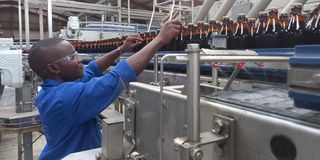Keroche Breweries among 24 alcohol manufacturers at risk of losing licenses in 21 days

A worker at Keroche Breweries in Naivasha.
Keroche Breweries, associated with Nakuru Senator Tabitha Karanja, and London Distillers are among 24 alcohol manufacturers that could lose their licenses in 21 days if they do not comply with the government’s listed guidelines to continue operating.
Interior Cabinet Secretary Prof Kithure Kindiki said through a statement on Friday that only three manufacturers and distillers of second-generation alcohol out of 29 have been allowed to resume production, subject to meeting specific requirements outlined to each of them.
The three are Kenya Wine Agencies Limited (KWAL), Savanna Brands Company Limited, and Patiala Distillers Kenya Limited.
For KWAL, the CS said that verification and approval of the model of the transmitter for offloading and dispatch flowmeters was approved, and for Savanna Brands Company Limited, the vetting agencies were certified with their production of valid calibration certificates of GC machine and services done on them; and payment of the standards levy.
Only two out of 29 distillers and manufacturers of second-generation alcohol have been passed the vetting by the multi-agency team and allowed to continue with production.
The two companies includes Kenya Nut Company Limited, and UDV.
The CS said that 24 distillers and manufacturers of second-generation alcohol risk having their licenses cancelled if they do not comply with listed guidelines within 21 days from Monday, April 8, 2024.
Among the 24 includes Keroche Breweries Limited, which is associated to Nakuru County Senator, Tabitha Karanja.
The list of the 24 entities which are on the verge of losing their licenses includes Two Cousins Distillers Limited, Corobus Africa Products Limited, Lyniber Supplies Limited, Elle Kenya Limited, Zheng Hong (K) Limited, Rift Valley Brewing Company – Thika, FRM EA Packers Limited, Manchester Distillers Limited, Kedsta Investment Limited, Julijo Investment Limited, Platinum Distillers Limited, London Distillers Kenya Limited, Agro Chemicals and Food Processing Company.
Others are Crywan Enterprises, Lumat Company Limited, Fastlane Wines and Spirits, Algarve Distillers Limited, Viva Bedida, Metro Breweries, Sabibu Beverages Africa Limited, Lodiani Water Spring, Africa Spirit Limited, and Mamboleo Distillers.
The CS said that 24 distillers and manufacturers of second-generation alcohol risk having their licenses cancelled if they do not comply with listed guidelines within 21 days from Monday, April 8, 2024.
Bar owners concern
The CS's statement comes a few hours after the Pubs, Entertainment and Restaurants Association of Kenya (PERAK) raised an alarm over the silken from the government after the 21 days of vetting elapsed.
According to directives issued by the government through the Ministry of Interior in its war on illicit alcohol, narcotic drugs, and psychotropic substances, vetted genuine licence holders should be allowed to resume operations after the vetting process.
While addressing the media, PERAK said that their businesses continue to suffer due to the closure even as they comply with the government directives.
PERAK National Chairperson Mr Michael Kiragu Muthami said that the more they continue closing their shops means that millions of shillings are being lost.
“We have not heard any information from the government regarding the outcome of this vetting process. We have remained in the dark on what the steps the government has taken towards streamlining the alcoholic licensing regime within the industry,” Mr Muthami said.
The association stated that the traders within the sector continue to face harassment from law enforcement officers, some of whom have deviated from the directives that were issued.
“They have taken advantage of the confusion to constantly harass our members in the guise that they are implementing a government directive to close all outlets selling alcoholic products.”
Also, the association has challenged the Council of Governors (CoG) to come out and defend its role of licensing such businesses, which Deputy President Rigathi Gachagua said will be taken by the national government.
“The national government through NGAO and police is usurping the county government functions. The licensing of alcoholic drinks was devolved to the county governments.”
In their statement, the association stated that if the government takes control of the licensing role, many businesses will be affected since each county is supposed to run its affairs differently.
“The alcoholic acts in each county will deal with alcohol differently, you cannot compare the act in Mombasa where we have tourists to the one in Mandera.”





